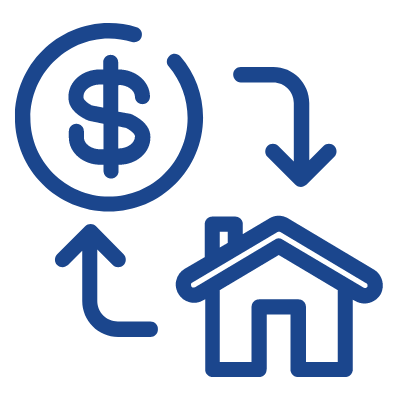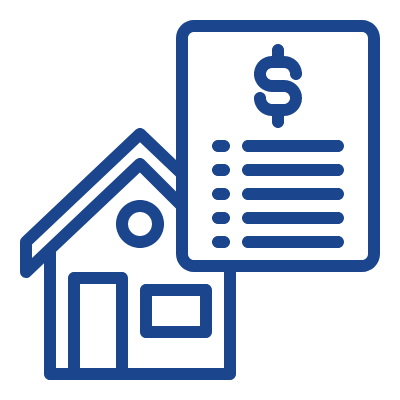
Convert your home equity into retirement cash.
HECM Reverse Mortgage
A Home Equity Conversion Mortgage (HECM) is the most common reverse mortgage. The HECM allows homeowners over 62 years old to obtain equity from their home and turn it into tax-free cash.** As long as you follow the loans terms and continue your other payment obligations such as homeowners insurance, property taxes and maintenance,* you can remain in your home and use the cash for your retirement expenses.
Access the equity you’ve built in your home with a HECM Reverse Mortgage.

Get money your way
Turn your home’s equity into monthly payments, a line of credit, or a lump-sum payment.

Stay in your home
Keep your home and live your retirement dreams.*

Safe and secure
You own your home, just as with any mortgage.*
Who is an HECM Reverse Mortgage for?
If you are at least 62 years old and outright own your home or have paid down a considerable amount on your home’s mortgage, you may be eligible for a HECM Reverse Mortgage. Currently, the maximum claim amount for HECMs is $970,800. If your home is valued above $900,000, you may want to consider a Jumbo Reverse Mortgage.
A HECM is good for people who are looking to access the equity in their home. This might help you clear credit card or other debt, pay for home improvements, pay medical bills, or contribute cash for an early retirement.
To qualify for a HECM, you must also occupy the property as your primary residence, not be delinquent on federal debt, and be able to continue making timely payments of property taxes, insurance and maintenance costs.
Why should I refinance my HECM Reverse Mortgage?
If you already have a HECM reverse mortgage, refinancing your loan can help you in a number of ways. First, you may be eligible for higher loan amounts if your home’s value has increased. You can also explore other new reverse mortgage options, including a Jumbo Reverse Mortgage.^
How does a HECM Reverse Mortgage work?
A HECM reverse mortgage allows you to convert the equity in your home into cash. Just like a traditional mortgage, HECMs offer fixed and adjustable rate loans. Your payment plan is based on your age, the current interest rate, and your home’s value. You can choose a payment plan based on your unique financial needs.
How do I know if I qualify for a reverse mortgage?
Both you and your property have to qualify for a HECM Reverse Mortgage. The US Department of Housing and Urban Development (HUD) has a full list of requirements, but our expert loan specialists can also help you understand the different reverse mortgages and find a loan that works for you.^^ We can discuss the first year payment limitations, payment options, the loan approval process, and repayment terms. Call us today at 1-877-856-3559 or fill out our contact form and we can get you started.
How do I apply for a HECM?
To apply for a HECM, you meet with an independent housing counselor who explains the cost of the loan and the financial implications, so that you are entering the process fully informed. We will then determine how much you can borrow based on factors established for the HECM program.
Disclosures:
*Borrowers must follow the loan’s terms and continue to pay property taxes, homeowners insurance and maintenance, otherwise the loan will become due and payable and may lead to foreclosure.
**Consult a tax advisor.
^There are closing costs associated with refinancing a reverse mortgage.
^^Nationwide Equities/ Senior Choice Group is not a part of HUD or any other governmental agency.

We work with you.
Our team is here to help you understand the reverse mortgage process and which lending option is the best for you.
Frequently Asked Questions
Have questions about reverse mortgages or the reverse mortgage process? See our Frequently Asked Questions.

Copyright © 2022 – All Rights Reserved
Senior Choice Group is a branch of the Nationwide Equities Corporation located in Nottingham, Maryland.
These advertisements and materials are not provided nor approved by the U.S. Department of Housing and Urban Development (HUD) or the Federal Housing Administration (FHA).
This website is not valid in New York and Washington.
